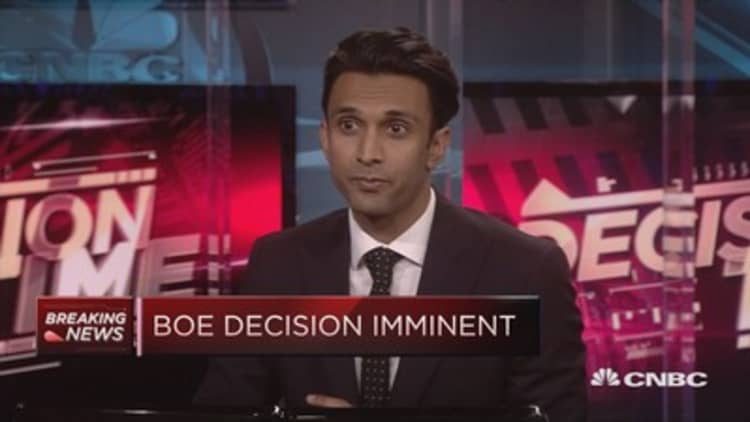
The Bank of England's (BOE) Monetary Policy Committee (MPC) voted 9-0 on Thursday to keep its monetary policy unchanged, leaving the U.K. interest rate at 0.5 percent in a result widely expected by markets.
The focus now moves to inflation, which is at a five-and-a-half-year high, putting pressure on the bank to raise interest rates in order to temper rising living costs. Markets are looking for clues as to when and how frequently any rate hikes might take place in the coming year.
"Unfortunately, the MPC did not offer much," said Kallum Pickering, senior U.K. economist at Berenberg, in a research note, adding that the central bank is not yet ready to begin the process of preparing markets for the next hike.
Sterling dipped slightly from 1.3446 against the dollar to 1.3413 on the announcement as did the 10-year gilt yield, which moved from 1.214 percent to 1.206 percent, though the result was largely priced into the markets already.
The unanimously dovish vote to maintain rates and quantitative easing reflects a desire to shelter a fragile British economy dented by Brexit uncertainty. Britain's growth outlook remains low — in late November, the country's Office for Budget Responsibility downwardly revised its outlook for productivity growth, GDP (gross domestic product) growth and business investment.
But the MPC's policy stance remains controversial for some, especially amid heightened U.K. inflation. The Office of National Statistics on Tuesday reported the headline consumer price index (CPI) rate at 3.1 percent, the country's highest since March 2012 and well above the bank's target inflation rate of 2 percent.
Bank of England Governor Mark Carney now faces tough decisions ahead as the bank must deal with both ongoing Brexit bumps to the pound and climbing prices on consumer goods.
On November 2, the BOE raised rates for the first time in nearly a decade from 0.25 percent to 0.5 percent. But the pound dropped on the news as the bank suggested rate increases would be very gradual and limited going forward. Recent weeks have seen rocky fluctuations for the currency amid challenging Brexit negotiations.
Berenberg expects that the next rate hike will not come until the second quarter of 2018. "Expect stronger guidance on the path of rate hikes at the February 2018 inflation report when the BOE will also updates its economic forecasts," Pickering said.
November's CPI numbers have been largely in line with the BOE's expectations for peak inflation, which it hopes will ease for December as the impact of sterling's fall since the June 2016 Brexit vote begins to subside.
In October, the International Monetary Fund downgraded its long-term U.K. growth forecast from 1.9 percent to 1.7 percent, singling it out as a "notable exception" to an improving global economic outlook.


